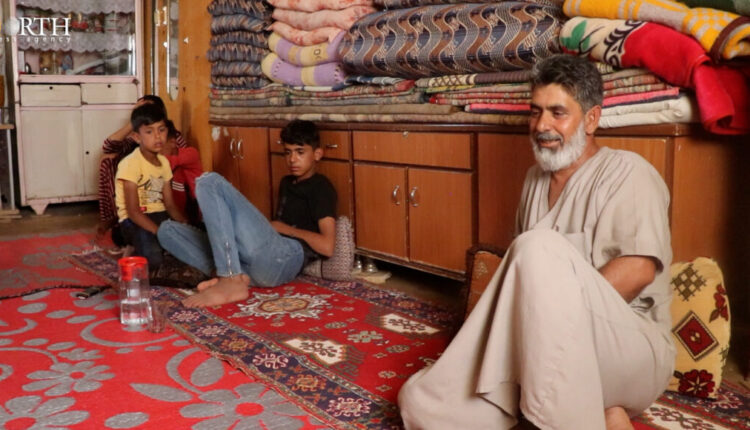
QAMISHLI, Syria (North Press) – The 14th of June was unusual day for Abdulghani Ismail, while he was working in his shop on the main road east of the city of Qamishli, northeastern Syria, after he escaped death when a Turkish drone targeted a civilian car near his workplace.
Ismail, 29, recounts the details of that day “We were in the shop when a Turkish drone targeted a civilian car on the main road, about 50 meters away from my shop. So we escaped through the back door. The targeted car, which left the road and stopped in front of my shop, was bombed again.”
“Four people lost their lives and others were injured. Thanks God, we survived, as I managed to escape from the back door when I heard the bombing, we knew that they would do it again, they bombed twice after that,” he further explained.
“I survived, but my car was badly affected, it is still in an automobile repair shop, I have spent $3,000 to repair it so far,” the shopkeeper told North Press.
In June 14, a Turkish drone strike killed three civilians and a member of the Syrian Democratic Forces (SDF), in addition to injuring a number of civilians, as well as, material damage was reported.
On June 20, a Turkish drone targeted a vehicle carrying officials of the Autonomous Administration of North and East Syria (AANES) near the village of Beyandur, east of Qamishli. The attack killed the Co-chair of the Qamishli Region Council, Yusra Darwish; the Deputy Co-chair, Leyman Shouish; and their driver, Farat Toma; as well as, it injured the other Co-chair, Gabi Shamoun, while they were on their way to visiting AANES institutions.
While the effects of the bombing are still visible on the walls of Ismail’s house, which is about seven km from the Turkish border, he struggles to return to his normal life.
“We always have fears that we will be targeted again, I come to work but I feel insecure even though my shop is in a remote area,” he concluded.
The AANES said in a statement that the Turkish drone attacks coincide with the AANES decision to begin trials for foreign Islamic State (ISIS) detainees.
“Turkey, the sponsor of terrorism, does not want to be exposed for supporting and providing an incubating environment for ISIS in [its] occupied areas [in northern Syria],” the AANES statement read.
The Turkish drones strikes have become a nightmare that haunts the residents in the AANES’ areas, in light of the ongoing incidents, amid appeals to the guarantor states of the 2019 ceasefire agreement – the US and Russia – to assume their responsibility to stop the Turkish attacks.
In the village of Gire Merki, in the countryside of the town of Terbespiye (al-Qahtaniyah), northeast Syria, Muhammad al-Salem, 49, walks slowly in his house as he had nephrectomy due to injuries he got in a Turkish drone attack earlier this year.
Al-Salem, a father of five, recounts the details of his injury to North Press “I was passing on the main road on my motorcycle, returning home from the town of al-Jawadiya on January 17. A Turkish drone hit Ari shop on the main road.”
As a result of the bombing, al-Salem was injured, and doctors removed one of his kidneys, and he also suffered fractures in some places in his body, making him unable to work, although he is the only breadwinner for his family.
At the time, the attack killed two civilians, including a child, and injured others.
“We live in anxiety and tension, we are targeted, and we do not know at what time the drones may target us. We do not feel safe anywhere even inside our homes,” he told North Press.
According to the Monitoring and Documentation Department of North Press, during the first half of 2023, Turkey targeted 257 sites with 1,160 strikes, 141 of which were residential sites, in various regions of northeastern Syria.
Turkey attacked north Syria with 34 drone strikes, leaving behind 73 casualties, killing 44 individuals and injuring 29 others. The number of civilian victims constituted 27 percent of the total toll of victims, according to the Department.
The residents of the areas adjacent to the Turkish border in the AANES-held areas live in a constant state of fear, especially the Turkish border guards firing live bullets randomly towards the Syrian territories, according to what residents told North Press.
Abdulbaqi Suleiman, the co-chair of the People’s Municipality in the village of Helwah, east of Qamishli, told North Press that “Recently, threats have escalated to border areas in which we work, when explosions occur, our service projects are pended; there is no stability in the region.”
“We provide necessary services such as water and sanitation maintenance, while other projects are pended due to these concerns,” the official said.
Suleiman, accompanied by employees of the municipal fire department, witnessed the Turkish bombing of the car in their village, Beyandur, when they rushed to rescue them and put out the fire.
“These attacks spread panic among residents, as we find it difficult to secure services for them, after each explosion, our work is pended for several days for fear of being targeted again,” the official concluded.
